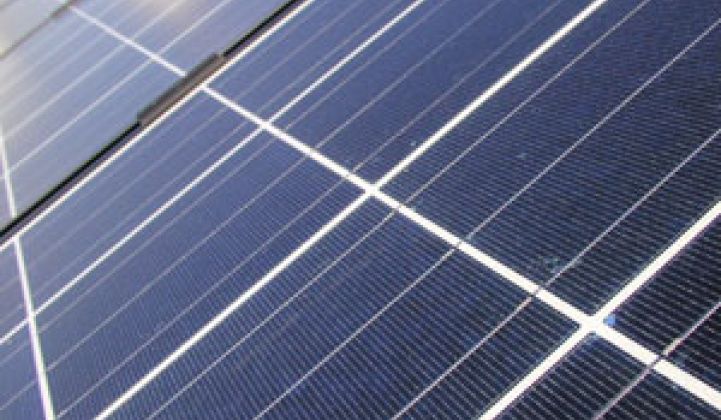Suntech Power Holdings Co. said Thursday it is entering the solar-power financing and management business by buying EI Solutions, a solar integrator and installer.
Suntech (NYSE: STP), which makes solar cells and panels, also said it has formed a joint venture with MMA Renewable Ventures, which finances, owns and operates commercial solar projects.
The new venture, called Gemini Solar Development Co., plans to finance, develop and operate large solar power plants of 10 megawatts or more. Kristina Peterson, Suntech's director of structured finance, will become Gemini's president.
MMA Renewable Ventures, based in Baltimore, Md., lines up financing, installers and customers for solar-power projects. MMA makes money by agreeing to pay for the cost of building and operating a solar power system in exchange for the tax benefits of owning the projects and long-term power-purchase agreements from its customers, which are typically businesses or schools, including Macy's and University of California at San Francisco.
MMA is teaming up with Suntech to make sure it can get large volumes of solar panels at a low cost as both companies go after utilities and other larger customers, said Mark McLanahan, senior vice president of corporate development at MMA.
"It makes sense to join forces with a supplier at the scale of Suntech's because you are talking about bigger customers, higher expectations, more capital at stake and more equipment at stake."
Gemini Solar is a 50-50 joint venture based in San Francisco, McLanahan said.
Lining up a partner also makes sense at a time when the financial market turmoil means fewer banks will be available to offer loans for building solar and other renewable energy projects. The credit crunch will likely increase the cost of solar electricity, but it's difficult to say by how much, McLanahan said.
"You can assume that it will bring up the price of delivered kilowatt or megawatt hours because your debt costs are higher, the conditions are more onerous and the transaction costs will be higher," McLanahan said.
The joint venture marks Suntech's first foray into the project financing and management business and underscores its ambition to grab a larger slice of the U.S. market. With its newly announced initiatives, Suntech said it plans to triple its U.S. sales in 2009.
Suntech has said it sees the United States as a potentially large and important market (see China's Suntech Power to Come to California and Suntech to Build Plants in U.S.)
So far, the market has been driven by a growing number of states and cities that offer solar incentives and require utilities to buy renewable energy. It is also driven by federal incentives that are currently set to expire by the end of the year (see U.S. Solar Could Surpass Germany Market by 2011, California Cities to Offer Solar Loan Program and Massachusetts Passes Sweeping Energy Bill).
Wuxi, China-based Suntech expanded its presence in Europe and Asia earlier this year by opening sales offices in Germany, Spain and South Korea.
Suntech's acquisition of ;_blank">EI Solutions also represents the solar manufacturer's expansion in the U.S. market. EI Solutions, based in San Rafael, Calif., engineers and builds solar-power plants and counts Google, The Walt Disney Co. and The North Face among its customers.
As a Suntech subsidiary, EI Solutions will be renamed Suntech Energy Solutions. Andrew Beebe, EI Solutions' current president, will head the new subsidiary. Suntech declined to disclose the price of the deal.
With Gemini and EI Solutions, Suntech believes it can stand out among competitors when bidding for contracts with utilities, government and businesses.
Last month, Suntech said it had begun building a new solar cell factory in Yangzhou, China. The company expects the factory to make as much as 300 megawatts of solar cells by the end of 2009. With the new factory, the company's total capacity will reach 1.4 gigawatts in 2009 and 2 gigawatts by the end of 2010.
The announcement didn't lift Suntech's stock however.
Shares fell 17 percent to $30.21 per share in recent trading as the financial market turmoil, compounded by the uncertainty of a $700 billion government bailout plan and nearly $18 billion in renewable-energy tax credits, has caused investors to be wary of solar stocks (see Senate Sends Energy Tax Credits Back to House).
Suntech and other major solar companies such as SunPower and First Solar all saw their shares dropping by roughly 8 percent to 10 percent during recent trading.



